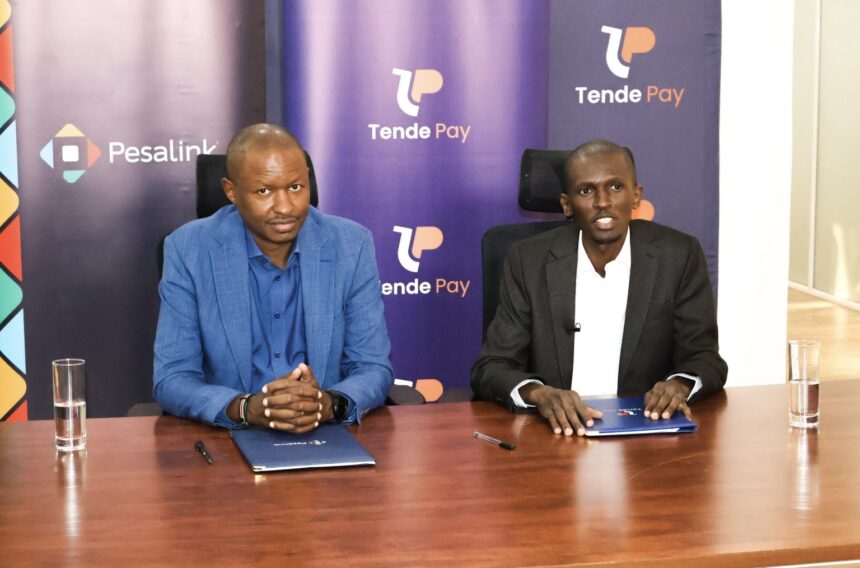Pesalink, the interbank money transfer service run by the Kenya Bankers Association (KBA), has partnered with Nairobi-based fintech TendePay to make bulk and single business payments faster and more seamless.
The deal allows small and medium-sized enterprises (SMEs) to move up to KES 999,999 ($7,700) instantly across all banks.
“This partnership reflects our evolution into a full spend management platform,” said TendePay CEO Abel Masai. “ With Pesalink’s trusted infrastructure, we are giving businesses a reliable, secure, and affordable tool to manage every payment, whether large or small, at any time.”
By leveraging Pesalink, TendePay clients can now process transactions on a CBK-regulated platform with automatic reconciliation. According to the team, this is a crucial feature for organisations managing thousands of daily transactions.
What You Should Know
Founded as a petty cash tool, TendePay has grown into a full spend management platform enabling businesses to handle payroll, supplier payments, utility bills, and customer collections in one place.
The timing of the deal is notable. In 2024, the Central Bank of Kenya (CBK) announced plans to develop a new fast payment system; potentially a structural reform expected to make transfers cheaper and interoperable.
Yet with no clear launch timeline, industry players such as Pesalink, Safaricom’s M-PESA, and Airtel Money have been expanding capacity and pursuing strategic collaborations to fill the gap. Market players are racing ahead with partnerships to address rising demand for real-time payments.
“At Pesalink, we believe collaboration is the key to helping businesses move differently,” Ken Lisudza, chief commercial officer, told TechCabal. “Pesalink was built on the principle of interoperability to simplify payments by delivering instant and affordable transfers across Kenya’s financial ecosystem.”
What This Means
Pesalink has increasingly become a central part of Kenya’s payments ecosystem, offering an alternative to mobile money platforms for high-value transfers.
Sector players, including Safaricom and the KBA, argue that instead of building a brand-new system, Kenya should consider upgrading existing infrastructure such as Pesalink.
Their position is partly cost-driven: building a fresh system could take up to four years and cost as much as $200 million, according to industry estimates.
Critics fear such duplication could delay much-needed improvements for businesses already facing cashflow and reconciliation challenges.
Understanding the Market for High-Value Transfers
Kenya’s payments market has shown signs of shifting toward high-value digital transfers. In September 2024, Safaricom doubled the per-transaction limit on its Pesalink mini app to KES 500,000 ($3,900), providing SMEs and corporates greater flexibility in handling bulk transactions.
The TendePay-Pesalink partnership raises the ceiling even further, giving businesses the ability to move nearly a million shillings instantly; a development for payroll-heavy sectors, suppliers, and service providers operating in tight financial cycles.
With businesses demanding faster, cheaper, and more integrated payment solutions, Kenya’s financial landscape is evolving through both private innovation and regulatory reform.
While CBK’s long-term FPS project is still in the works, partnerships like that of Pesalink and TendePay highlight the industry’s determination to meet immediate needs.
If successful, industry analysts say these moves could set the standard for future interoperability, ensuring that digital payments in Kenya are not only inclusive and instant, but also able to scale with the ambitions of the country’s SMEs.
Talking Points
It is notable that Pesalink and TendePay are enabling businesses to move up to KES 999,999 instantly across banks, a significant leap for SMEs that often struggle with liquidity and delayed transfers.
This single capability positions the partnership as a practical solution for real financial bottlenecks, especially for payroll-heavy firms, suppliers, and service providers managing high transaction volumes.
At Techparley, we see how integrations like this can accelerate digital transformation in Kenya’s business ecosystem, helping SMEs operate with efficiency levels once reserved for large corporates.
However, there’s still work ahead. Adoption will depend on how well the platform addresses issues like cost, user experience, and awareness among micro and small businesses, many of which remain heavily dependent on cash.
With the right strategic support and regulatory clarity, the Pesalink–TendePay collaboration has the potential to become a blueprint for high-value, real-time payments in Africa’s most dynamic digital economy.






